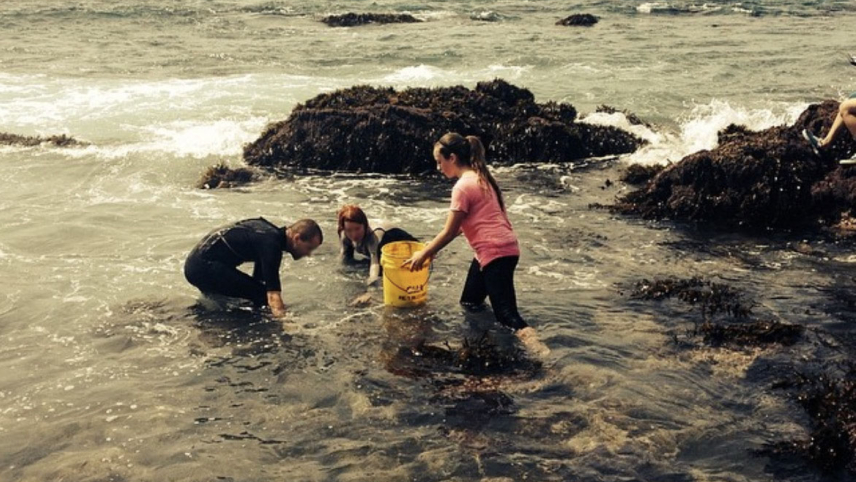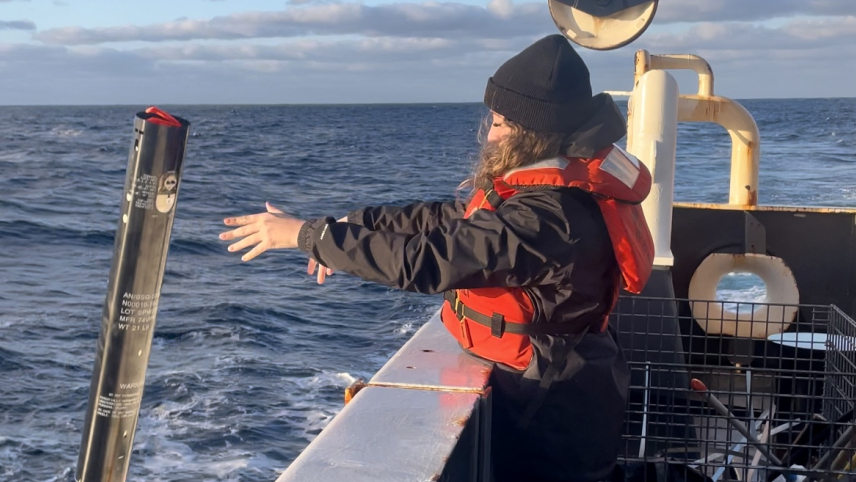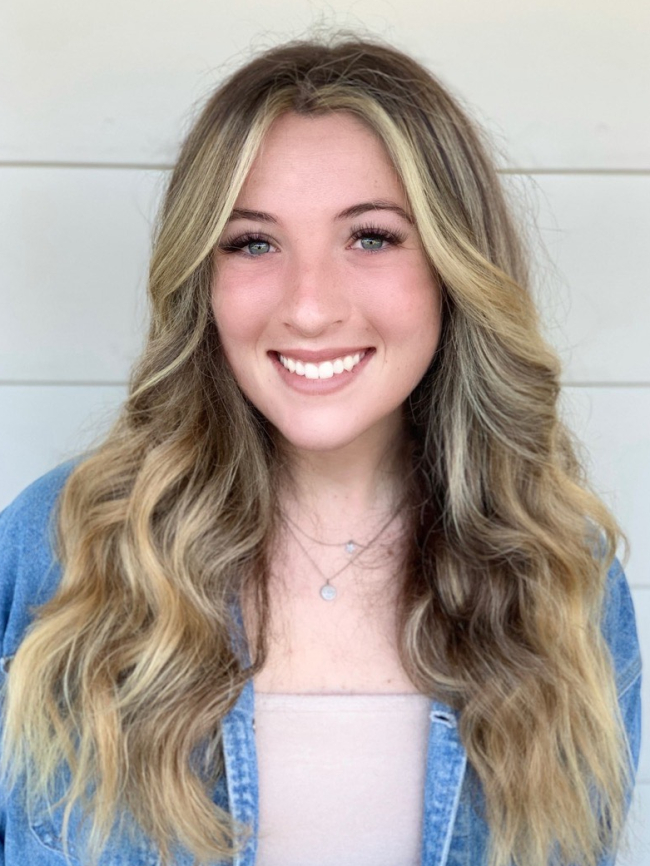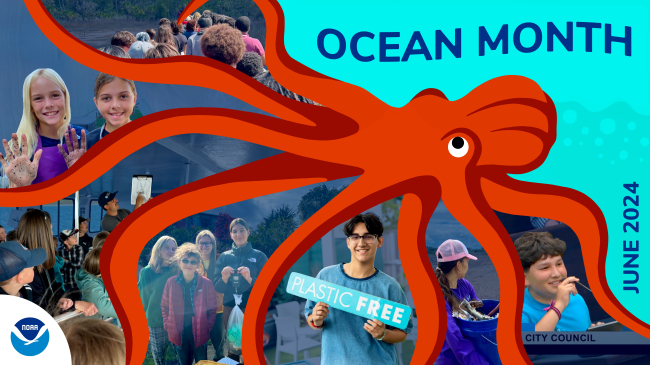For many college students nearing graduation, deciding where you want to take your future can feel like setting sail. The water seems vast, with endless directions to choose from and destinations out of sight. When Devynn Gately, a 2021 EPP/MSI undergraduate scholar, was trying to decide on a direction, a few mentors at NOAA helped her navigate to the next step in her professional journey — the NOAA Commissioned Officer Corps (NOAA Corps).
Learning the ropes

Devynn’s journey in marine science and marine conservation started when she was just nine years old at a boat show when a NOAA employee took the time to talk to her. “NOAA Fisheries had a table setup, and I knew who NOAA was, but I was a kid and it was nerve-wracking to go up to them,” says Devynn. “With a nudge from my father, I met one of my long term mentors and friend, Amber Rhodes. She connected me with a small research aquarium in the port of Los Angeles and so I started sitting in on surveys with them and docenting with them.” Devynn continued to work with the aquarium and took on other opportunities she encountered through the aquarium until she left for college.
Devynn pursued her interests in marine science and conservation by majoring in marine science at California State University, Monterey Bay and applying for the EPP/MSI Undergraduate Scholarship at NOAA. As an EPP/MSI scholar, she chose internships that allowed her to explore different interests — the first summer her internship focused on using pre-existing data to determine the likelihood that certain shark species would inhabit areas leased for wind farm development. For her second internship, she collected data in the field and data reported in other scientific studies to look at competition between species of fish and jellyfish that eat plankton.
Charting a course
Despite over a decade of experiences in marine science, or perhaps because of them, Devynn was still uncertain about her future career. “I was having a hard time narrowing down a focus, I enjoyed all the things that I tried as a volunteer and intern,” says Devynn. However, that changed during her second EPP/MSI internship, when a mentor observed her comfort at sea collecting data. “Wes Parker, who’s the vessel coordinator, noticed that I adapted well to the fast-paced environment that comes with being at sea and I wasn’t scared or nervous about any of the duties. He said ‘You’re fearless in that respect, you have a certain comfort level being at sea, have you thought about applying to NOAA Corps?’,” says Devynn, “Before Wes said that, I didn’t know enough about NOAA Corps so I hadn’t considered doing it ... I needed someone to recognize my strength and push me in a direction. I’m extremely grateful to Wes for that.”
Setting sail

With the support of many mentors throughout her education, including EPP/MSI mentors and staff, Devynn applied to NOAA Corps. This process included an application, letters of recommendation, official college transcripts, resume, cover letter, and a two hour interview. To prepare, she started her application early and met with former and current NOAA Corps officers to better understand what it means to be in the NOAA Corps. Though getting into the NOAA Corps is competitive, Devynn’s hard work and enthusiasm for marine science opportunities paid off — she was accepted and will begin basic officer training this year.
Read more about her experience with the NOAA Corps application below in Devynn’s tips for applicants.
New horizons
Devynn is excited to get started. She looks forward to taking on new challenges, learning new things, and giving back to NOAA. “I’m excited to step outside of the science side and my comfort zone — I’m ready. And, I’m sure I’ll see so many amazing things and places. Apart from EPP/MSI, there are parts of academics where I haven’t felt super challenged, so I’m looking forward to that growth. My overall goal is to give back to NOAA as an organization and make kids of all backgrounds feel they have a place in oceanic sciences. Ultimately, our planet depends on the future generations,” says Devynn.
By looking at the end destination, Devynn’s arrival at NOAA Corps seems like it could have been pre-planned. But, her journey serves as a reminder that when we set sail towards a career and feel overwhelmed by options, our mentors and experiences act as buoys. They recognize our skills and help us sort through our aspirations to guide us towards our next destination. In Devynn’s case, the EPP/MSI program helped her connect with such mentors. “The EPP/MSI program helped me find my niche … it opened my eyes to everything out there and helped me identify a talent I had,” said Devynn.
Can you briefly describe the application process for NOAA Corps and your experience with applying?
There are two application cycles a year. The application cycle I applied for was due in November and I started the process in July. The application starts with demographic information and background experience, and then there are three essay questions. After the application deadline, the interview period starts. The interviews can be two hours long, which sounds like a lot, but don’t panic — it gives you time to get to know your interviewer. I left the interview feeling like I got to know someone in the NOAA Corps. I interviewed in November and found out I was selected in mid-February. It’s a long application process, but worth it.
Do you have any tips for future applicants?
Start early
Starting the application early was super helpful because my peers and mentors were able to guide me and review my essays. It helps to have your mentors very involved in the application process. I was so honored to receive letters of recommendation from the people I worked with through the years.
Talk to NOAA Corps officers
Talk to NOAA Corps officers, both current and no longer active so you know what you’re getting into before applying. When you do your interview, they will make sure that you have realistic expectations of what it’s like being in the NOAA Corps.
Pursue opportunities to spend time at sea and doing NOAA-related work
Pursue any opportunities to have some time at sea — NOAA vessel or not. I started working and volunteering in this field, marine science and conservation, when I was nine years old. Amber Rhodes, who I met at the NOAA booth as I mentioned earlier, connected me with a small research aquarium in the port of Los Angeles, California. I started sitting in on surveys with them and docenting with them when I was nine and continued until I had to move for college. Through the aquarium, I also got involved in their partnership with Marine Mammal Care of LA offsite link. Pursue every opportunity, and do all of the things! Future you will be grateful.
Know that NOAA Corps is competitive
Be aware that the NOAA Corps is super competitive, especially when you are still just out of college. When I talked to the officers, a lot of them were like “Hey kid, I had to apply two or three times, you might have to apply multiple times, but just keep trying.” Typically there are between 150-200 applicants every year and the classes are about 15-20 people.
About the NOAA Commissioned Officer Corps (NOAA Corps)
The NOAA Corps is one of the nation’s eight uniformed services. With a combination of commissioned service and scientific expertise, officers support nearly all NOAA programs and missions. They rotate between assignments aboard NOAA ships or aircraft and land-based assignments. Officers always serve according to the NOAA Corps values of honor, respect, and commitment. Read more about the NOAA Corps.

Devynn Gately
Devynn Gately is a 2021 EPP/MSI undergraduate scholar and graduated from California State University, Monterey Bay in 2023 with a B.S. in Marine Biology. In the fall, she will begin Basic Officer Training as an Officer Candidate in the NOAA Corps. She is grateful for everyone who has been involved in her journey so far — friends and family, mentors, particularly Amber Rhodes, Elliot Hazen, Correigh Greene, Ph.D., Julianne Passarelli, Ph.D., Sherry Palacios, Ph.D. offsite link, and the EPP/MSI program and peers.




